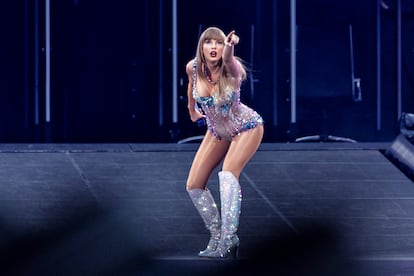Cryptomnesia: The unconscious plagiarism affecting the music industry
The documentary ‘Taking on Taylor Swift’ delves into the plagiarism allegations regarding her hit ‘Shake It Off’ and reflects on the issue of cultural appropriation

Only 12 notes are employed, and most pop music is based on similar chord structures. So accusations of plagiarism are commonplace in pop. It happened to George Harrison, who had to sign away two-thirds of the rights to his first big solo hit, My Sweet Lord; apparently it sounded too much like He’s so Fine by the girl band The Chiffons. The musician had to admit that he knew that song but was convinced that he had written something original. Led Zeppelin, The Beach Boys, Bob Dylan, Michael Jackson, Lana del Rey, Oasis and Coldplay, among many others, have found themselves in similar, though often unresolved, predicaments. Melodies and lyrics are often repeated: Enrique Bunbury, the lead vocalist for Héroes del Silencio, for example, was singled out for 37 songs that were, let’s say, inspired by the writing of others – mostly poets.
Unintentional or unconscious plagiarism has been dubbed cryptomnesia. It has nothing to do with Bitcoin but, instead, with buried memories that have lost their source and context. Songwriting is a complicated matter: the creator turns a melody around in their head and finds lyrics to fit. No song is created in a vacuum. There are always influences from the past. On the other hand, there is a long tradition in American music of covering other people’s songs without crediting the original. Only with the professionalization of the recording industry in the 1940s and 1950s did a corps of composers materialize, writing songs for the big performers; only in the 1960s did the idea of musicians composing their own songs take off.
When an artist is accused of plagiarism, they have two choices. They can claim cryptomnesia and save their honor while negotiating a financial deal with the original author and adding them to the credits. Or, as many artists prefer, they can plead ignorance of the original, and claim that any resemblance is mere coincidence. In such cases, judges have to fall back on musical or literary experts, and finally get down to the nitty-gritty of deciding how much one song resembles another.
Shake It Off is arguably Taylor Swift’s most recognizable song. Its chorus goes, “Cause the players gonna play, play, play, play, play, play, play, play / and the haters gonna hate, hate, hate, hate, hate, hate, hate, hate, hate,” – lyrics that suggest that she’ll be able to ride out any criticism that comes her way. The song was an overwhelming hit in 2014, and still gets a lot of air play, but it turns out that some of the lyrics are almost identical to those of Playas Gon’ Play, written by Sean Hall and Nathan Butler for 3LW, an all-female trio that released it in 2001 (“Playas, they gon’ play / they gon’ play / And haters, they gonna hate / they gon’ hate”). It took five years of fighting in court for the parties to reach a settlement in 2022, one that has been kept under wraps ever since.
The lawsuit is the subject of a CNN documentary: Taking on Taylor Swift. Hall and his lawyer speak, music and copyright experts offer their opinion, and many other cases of plagiarism whose degree of cryptomnesia is difficult to gauge are cited. Olivia Rodrigo, a star who has been heavily influenced by Swift and has acknowledged her as co-author of several of her songs, weighs in.
Meanwhile, the defense strategy of Swift’s team was somewhat confusing. In her first written statement, she claimed that she had never heard the 3LW track, because only country CDs were played in her home and the radio was never on. That argument fell apart when an old recording surfaced in which the young singer declared herself an enthusiast of the MTV show Total Request Live, where Playas Gon’ Play had been performed, with some impact at the time. The judges initially considered the disputed phrase too “banal” to be protected by law, but there were successive appeals which ended up deciding the issue. It is legitimate to deduce that there was some financial compensation, but not an acknowledgement in the credits, nor a confidentiality pact.
The most controversial aspect of the documentary is the view that there is a pattern to this type of plagiarism associated with the systemic racism of the culture industry. In American pop, it has been all too common for white artists to appropriate the creations of Black artists and make them available to a wider audience — not just songs but styles, rhythms, verses and slang. It may be considered too sweeping a conclusion for this particular case — a minor blemish given the singer’s trajectory, but there is no lack of precedents. And, as in My Sweet Lord, we have a big white star using elements of a song from a less illustrious African-American girl band.
On the alleged plagiarism of Shake It Off, the CNN documentary offers no verdict, just as there was none in court. It points out that when a song remains in the subconscious of many who hear it, a phrase from that song can transcend into contemporary language. Sooner or later, that phrase will again be used in a different song. Swift’s defense argued that it would not be possible to make songs today without repeating expressions said by others. So, a complex debate remains. Pop has always been voracious in feeding off outside influences.
Of course, cryptomnesia is not something that happens only to musicians. Do you really think all your ideas are original?
Sign up for our weekly newsletter to get more English-language news coverage from EL PAÍS USA Edition
Tu suscripción se está usando en otro dispositivo
¿Quieres añadir otro usuario a tu suscripción?
Si continúas leyendo en este dispositivo, no se podrá leer en el otro.
FlechaTu suscripción se está usando en otro dispositivo y solo puedes acceder a EL PAÍS desde un dispositivo a la vez.
Si quieres compartir tu cuenta, cambia tu suscripción a la modalidad Premium, así podrás añadir otro usuario. Cada uno accederá con su propia cuenta de email, lo que os permitirá personalizar vuestra experiencia en EL PAÍS.
¿Tienes una suscripción de empresa? Accede aquí para contratar más cuentas.
En el caso de no saber quién está usando tu cuenta, te recomendamos cambiar tu contraseña aquí.
Si decides continuar compartiendo tu cuenta, este mensaje se mostrará en tu dispositivo y en el de la otra persona que está usando tu cuenta de forma indefinida, afectando a tu experiencia de lectura. Puedes consultar aquí los términos y condiciones de la suscripción digital.









































